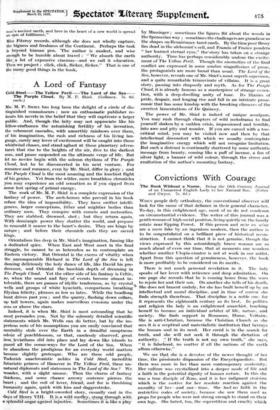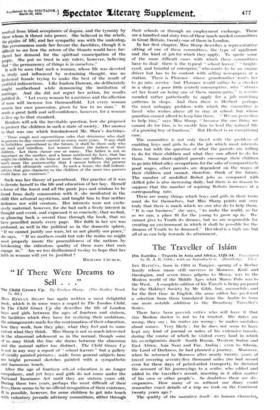• •
Convictions With Courage
WHEN people defy orthodoxy, the conventional observer will look for the cause of that defiance in their general character. To-day, in this enlightened age, most of us do not condemn on circumstantial evidence. The' writer of this journal was a gentlewoman of high social position, living quietly on the family estate near Epping Forest. If this person and wise en scene are a mere fake by an ingenious modern, then the author is to be congratulated on a brilliant piece of historical recon- struction. I cannot think that it is not genuine, though the views expressed by this astonishingly brave woman are so much ahead of even our time, that at moments one wonders whether another Utopia-creator is not at work in our midst. Apart from this question of genuineness, however, the book is more profitably to be considered on its merits.
There is- not much personal revelation in it. The lady speaks of her lover with reticence and deep admiration. On one page she records that he is coming home from the wars to rejoin her and their son. On another she tells of his death. • She does not lament unduly, for she has built herself up by an intellectual and moral discipline, and in time of sorrow she finds strength therefrom.. That -discipline is a noble one, for it represents the eighteenth century as its best. In politics and religion the lady is an enlightened anarchist, teaching herself to become_ an individual arbiter of life, nature, and society. She finds support in Rousseau, Hume, Voltaire. She is anti-Christian, because the Christian Church as she sees it is a sceptical and materialistic institution that betrays the human soul in its need. Her creed is in the search for truth, and she will not seek it through the dictation of authority. " If the truth is not my own truth," she says, " it is falseliood, no matter if all the nations of the earth affirm otherwise."
We see that she is a devotee of the newer thought of her time, the assionate dispassion of the Encyclopaedists. But there was more in her than mere contemporary modernity. Her culture was crystallized into a deeper mode of life and
a faith in the potential dignity of human nature. In this she was a true disciple of Zeno, and it is her indignant stoicism which is the motive for her resolute reaction against the
morality of her—and our—time. -She had no faith in the restrictive codes of society, because she saw them used as
props for people who were not strong enough to stand on their own legs. She hated, too, the superstition and cruelty which
resulted from blind acceptance of dogma, and the tyranny by those whom it thrust into power. She believed in the rebeli,
the gipsies of life; and her syrigiathY was with theunderdog. This perverseness made her favour the Jacobites, though it is difficult to see how the return of the Stuarts would have fur-
thered her demand for the spiritual emancipation of the people. She put no trust in any rulers, however, believing
that " the permanency of things is in ourselves."
R will he seen that such a woman, whose life was devoted to study and influenced by restraining thought, was no hysterical female trying to !flake the best of the result of youthful indiscretions. Like Isadora Duncan, she deliberately sought motherhood while denouncing the institution of marriage. And she did not regret her action, for results justified it. " Let every woman be a mistress and the affection of man will increase ten thousandfold. Let every, woman remain her own possession, given by law to no man." It needs a great faith and Self-confidence, however, for a woman to live up to that standard.
Readers will ask the inevitable question, how she proposed to protect the children-in-such a state of- society. Her answer to that was one which foreshadowed Mr. Shaw's doctrines.
"These rough and superstitious rules that determine who shall be parents to-day cannot control us many more years. If any shall be forbidden parenthood in the future, it shall be those only who are mad and mindless. Let women choose the fathers of their children. Let them choose one or many. The father is not so important as the mother, and a home mothered by love, that has sought its children in the loins of more than one father, appears so much more the praiseworthy that I cannot believe the present manner will ultimately survive. In such a home, the dull indenti- ealities that give-character to the children of the same two parents would have no existence."
Such was her theory of parenthood. Her practice of it was to devote herself to the life and education of her boy. Herself a lover of-the forest and all the panic joys and wisdom to be found from daily communion with it, she inculcated in the child this arboreal mysticism, and taught him to fear neither darkness nor wild creature. Her interests were not exclu- sively maternal, however, for she had such a lively interest in thought and event, and expressed it so concisely, that we find, on glancing back a second time through the book, that we have pencilled nearly every page. Her faith in her sex was profound, as well in the political as in the domestic sphere. " If we cannot justify our wars, let us not glorify our peace,"
she says. " If we mothers could but rule the realm we might most properly insure the peaceableness of the nations by betokening the ridiculous quality of these wars that men engage in." Are we too disillusioned to-day to hope that her faith in woman will yet be justified 1- RICHARD CHURCU.

















































 Previous page
Previous page